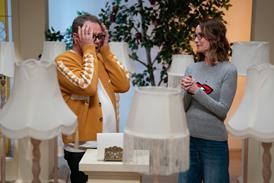Broadcaster:ITV
Producer:IWC Media
TX dates:11, 12 13 March at 9pm
Length:3 x 90 minutes
Commissioning editor: Nick Elliott
When IWC Media's head of drama, Eileen Quinn, received a novel in the post four years ago, she did not hold out much hope of adapting it for TV. 'My heart sank because it's a heavy brick of a book,' says Quinn of The Roth Trilogyby crime writer Andrew Taylor. 'The agent who sent it said: 'It's over 1,000 pages long but stick with it.' By the end of the weekend I wanted to buy the rights. I was in love with the structure.'
The book tells the story in reverse of a murderer called Angel. The trilogy starts with her crimes in the present day and works its way backwards through her life to explain why she became a psychopath. Quinn turned to scriptwriter Peter Ransley three years ago to adapt the story into a trilogy of films. 'I sent it to him because we'd been having an ongoing discussion about nature versus nurture,' says Quinn.
Ransley wrote a treatment for the whole project and a script for the first film, which Quinn presented to ITV director of drama Nick Elliott 18 months ago. 'I got the fastest response I've ever had from a broadcaster,' she says.
Like Quinn, Elliott was captivated by the narrative structure. 'I was intrigued by the notion of telling a story backwards,' he says. The script also appealed to the high-profile cast which includes Emilia Fox and Charles Dance. 'Everyone was keen to do it; they rushed at it,' says Elliott.
Fox plays the central character of Angel, while Dance plays her father, David, a retired priest. In the first film, thirtysomething Angel abducts the daughter of a childhood friend. The crime leads a trail back to her own troubled youth in Roth, where she became obsessed with the town's previous vicar and suspected child killer, Francis Youlgreave. The second and third films follow Angel back in time to the ages of 17 and five respectively to uncover the seeds of her dangerous obsession.
Quinn believes the journey back into the main character's personal history was the key to securing her own wish list of actors. 'Actors in rehearsals often sit around wondering what their characters were like in the past,' she says. 'This drama lets them find out.'
Elliott, meanwhile, thought Fallen Angelcould mark a departure for ITV drama. 'I had inflicted too many two-part psychological thrillers on the nation that had become repetitive,' he says.
With a commission in the bag, Ransley then spent from January to April last year writing the two remaining films. Quinn brought director David Drury on board and together all three of them focused on the scripts. 'We also had a consultant psychologist for Peter to talk to so the script had veracity,' says Quinn.
In April, Drury and Quinn began the arduous task of setting up the shoot. While the first film was set in north London, the next two were set in fictional towns, complete with churches and a country house. 'A lot of churches didn't want you to film in them and disrupt their routine,' says Quinn. 'Others wanted a lot of money.' The country house proved to be an even bigger headache. 'We needed one with a swimming pool for the second film,' says Quinn. 'Our designer said he would make a dip in the ground look like a pool at the house we'd chosen, but in the story the character was killed in the pool. In the end the character had to be killed in a different way.'
With the team struggling to find appropriate locations, Quinn turned to the book's writer for help. 'I rang Andrew Taylor and asked him what sort of places he had imagined when he was writing the book,' she says, eventually settling on St Albans in Hertfordshire and Little Missenden and Hambleden in Buckinghamshire for the second and third films.
Back in London, the 12-week shoot got underway at the start of July. For Drury, filming proved to be unexpectedly painful. 'I sustained an extremely bad insect bite in the back garden of the house we were using,' he says. 'I couldn't walk for two to three weeks and I was diagnosed with Lyme disease.'
Drury did not, however, let this hamper his customary filming technique. 'I tend to carry a second camera to get a lot more coverage,' he says. 'It allows me more time with the actors on the floor to polish a performance. You can do a wide shot and a close-up simultaneously.'
For Quinn, the biggest challenge during filming was the story's structure. 'The difficulty was trying to keep three movies in three different timescales in your head,' she says.
To help Drury assemble this complex narrative in post-production, editor Ian Farr had already pulled together a rough cut of Fallen Angelby the time filming wrapped in the middle of September. Drury went straight from the shoot into an editing suite at London post facility M2.
Quinn believes editing was the hardest part of the whole production. 'You couldn't lock down a film and move on to the next,' she says. 'You had to leave the door open to go back and insert flashbacks, memories and voice-overs. The third film was the easiest to edit because there was nothing to remember.'
After Drury had assembled his own version and presented it to Elliott for feedback, the final cut was delivered at the start of January. Elliott is hopeful that Fallen Angelwill help to set ITV drama on a different track. 'It's a piece of quite classy popular fiction,' he says. 'It will signal to the audience that the two-part psychological thriller is being left behind.'
Production credits
Writer: Peter Ransley
Executive producer: Eileen Quinn
Producer: Dave Edwards
Director: David Drury
Co-producer:Ian Rothkerch Jennifer A Klein
DoP:Simon Richards
Editor: Ian Farr
Line producer: David Mason
Production designer:Jim Grant
Facility:M2, Molinare
Casting:Kate Day


























No comments yet